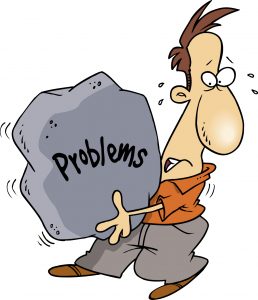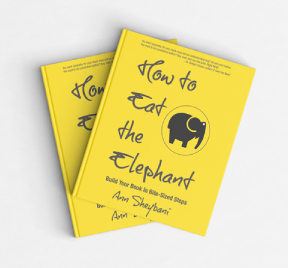Writing
What’s the problemo?
January 13, 2020
I’m going to share with you some important concepts I walk my clients through before they start in on a project.
If you’re an entrepreneur or a service professional, these ideas are going to be super useful even if you aren’t looking to write a client-attracting book, because they’ll help you market better and write more powerful copy.
Here’s the thing: before you start banging away on the keyboard producing your bestselling book, you’ve got to be crystal clear on who you help. You’ve also got to be able to identify the biggest problem they’re experiencing, the one you mean to address in your book.
Otherwise, you end up with a chocolate mess.
The people you help are known as your target market.
Now, no matter how much you’d like to be everything to everyone, that’s just not possible, for a whole bunch of reasons we don’t have time to get into here. That’s why you have to narrow down your target market, make it clear whom you help, and whom you don’t.
Entrepreneurs hate narrowing down their target markets. We resist this necessary part of the process because we want to spread our net wide and far, thinking this will yield us more clients, more success. But if you don’t narrow down your target market, you’ll get nowhere fast. Trust me on this.
As far as your book is concerned, readers won’t be able to recognize themselves or identify with the problem you’re promising to solve, if you haven’t narrowed down your target market, if you haven’t described their very specific problem in terms they understand (Note: not how you necessarily would describe it). In other words, they won’t buy your book.
One of the last ways of narrowing down your target market is figuring out where your potential clients are in the process. (I can always tell where my potential clients are in the process of growing their business by looking at the narrowness of their target market, or lack thereof.)
I’m going to clarify.
Let’s say you’re a parenting coach. Well, where are your parents in the process? (What’s the big problem common to that stage of the process?) Do you help expectant parents get ready for the chaos that’s about to descend upon them so they can experience more peace and tranquility? Do you help parents through the colicky infant phase so they can get some sleep and have occasional sex? Or do you help parents figure out how to discipline preschoolers so they can remain safe, yet autonomous?
You picking up on the nuance?
Let’s have some fun, by way of really driving this nuance home.
Go look at your bookshelf or scroll through your Kindle focusing on the non-fiction books you’ve purchased, the inspirational variety, the self-help, or the how-tos. Look at the money books, the weight loss, business, and mindset volumes. All the books that are problem-solution focused.
Why did you buy each of those books, do you even remember?
Think about your frame of mind. What were you worried about? What did you think you needed to change?
What problem were you experiencing when you decided you needed that book? What words would you have used to describe the problem you were experiencing, be it front burner or back, and the feelings associated with it?
Then, think back to the relative date of that book purchase. At what point in time did you decide you needed to address that problem, the one the book promised to alleviate? Where were you in the process?
Were you neck-deep in debt wondering how you were going to pull yourself out before the bank foreclosed on your house? Or sick to death of paying hundreds of dollars in credit card fees?
Had you gained another twenty pounds even though you swore you’d never fall into that trap again? Or questioning what it would be like to go gluten-free, if the needle on the scale might wiggle?
Were you worried that your sex life had fizzled, that you needed to spice it up again before your partner left you or had an affair? Or wondering if hormones could get you going again?
You catching the nuance there?
Here are some examples from my bookshelf:
The problem as I was experiencing it: How am I going to get rid of all this stuff, all the valuable things we’ve spent good money on as well as the junk? How am I going to be emotionally OK with clearing out a three-car garage, seven bedrooms, twenty closets, and two basements without losing my mind or decompensating from the waste of it all?
When I purchased the book: Shortly after I’d put my house on the market and was told I’d need to empty it out if I wanted to attract buyers.
2. Boundaries
The problem as I was experiencing it: How am I going to learn how to figure out which responsibilities are mine, and which belong to others so I can stop trying to do and control it all? How can I stop being such a people pleaser and develop some self-direction?
When I purchased the book: Right after I took an assessment test and discovered that my biggest issue was my lack of boundaries, a word I’d never heard before, at least used in that context.
The problem as I was experiencing it: How am I ever going to learn to punctuate properly so I don’t look illiterate? How am I going to learn this once and for all, not forget the rules the minute I think I’ve learned them?
When I purchased the book: When I was in grad school taking an editing class, recognizing that I needed a way to make the information sticky because the standard editing books were six-inches thick and nearly impossible to read. I got a 63 on an editing exam, which was bad, very, very bad.
4. The Millionaire’s Map: Your 21-Day Prosperity Playbook
The problem as I was experiencing it: How can I get over my lack of imagination when it comes to wealth, my lack of desire to amass more than $50k/year (my last salary)? How do I stop sabotaging myself the minute it looks as though I’m going to have a huge month in my business?
When I purchased the book: When I heard someone talk about set point, the notion that we each have a thermostat of comfort, that the minute we experience success in one area of our lives, the minute the other areas begin to fall apart to compensate, thereby bring the temperature back to status quo. The moment I recognized this tendency in myself, having sabotaged three sales calls right in a row.
Before you write another email, let alone a book, you want to be clear on who you serve, what problem you solve, and where you’re people are in the process. When you’re clear on these three things, your chances of capturing a potential client’s attention go up about a million-fold. And you’ll sell a ton of books.




